Copyright ©2008 PopEntertainment.com. All rights reserved.
Posted:
January 29, 2008.
Say
what you want about lawyers – and you probably do – you can’t accuse
attorney Mike Papantonio of selling his soul to the highest bidder. In fact,
the only green he cares about is environment-friendly, safe for babies and
other beings who will eventually inherit the earth.
We
know this because, in his practice, Papantonio goes after shady corporations
who have not yet realized what it means to respect people and planet.
He
may not be welcomed with a hug at
Big Brother, Inc.,
but
his broadcasts of his rants against all that is wrong – commonly known as
“The Pap Attack” – are growing legions of nodding heads.
“The
Pap Attack” is featured on his two labors of love: Ring of Fire on Air
America radio (broadcast weekly), and
www.goleft.tv, both of which are in-depth examinations of what is wrong
with The Right, and a clear-eyed look (with a squint) at everything from big
business to stem cell research.
Talk
about conservation – it’s a rare and beautiful thing to see balls hit into
Left field by the ballsy. Papantonio and his broadcast partner and fellow
attorney, Robert F. Kennedy, Jr. (yes, that RFK, Jr.), have double-handedly
created a new force in the new age of the new media.
This, of course, has caused the lemming army of sulking conservatives to dig
their nails deeper into the cliff, as the world at last loosens itself from
their icy grip. But Papantonio loves it – to him, there is nothing quite like a worthy
confrontation. Hence, his "Pap Attack."
With
Papantonio, and now with Goleft.tv and Ring of Fire, it’s no longer business
as usual. Here, he tells us how the future is now, and that the revolution
will be televised in cyberspace.
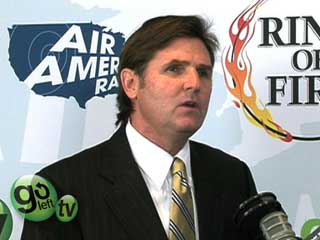 What inspired you to create
Ring of Fire and GoLeft.tv?
What inspired you to create
Ring of Fire and GoLeft.tv?
When
Bobby [Kennedy, Jr.] and I came up with this idea, I hoped it was for all
the right reasons. There was a need for what I refer to as ‘citizens’
media,’ and Bobby and I used to talk about what could we do.
The
only thing that looked like a possibility when we first thought of this was
the emerging Air America. We put a program on for them early on. I think it
was one hour when we first started. Out of that, I became more familiar with
what was happening out there. There really is a stacked deck against people
who have a progressive ideology.
Other than the ideology, how does your program differ from the powerful
right-wing-conservative talk radio?
It’s
easier for [right-wing conservatives] to talk about themselves as victims.
Victim discussion, victim dialogue is a lot easier for them. They’re always
the victim; they [say] that they’ve always been mistreated, that they’ve
never been treated fairly. [They say] the media doesn’t treat them right.
It’s that whole mindset that comes out of the person who says that I am
going to be an active, crazy, right-wing Republican.
Was it hard to find your audience?
Our
thought was, let’s take a shot and see if there is any market at all. The
whole time that Air America was struggling to stay alive, we knew -- because
we were seeing from our own numbers – that there was a hole in the market.
People were saying there was no place for them to go. If they couldn’t read
Nation magazine or The New York Times or Progressive
Populist, Mother Jones, whatever it was, if they couldn’t get
information there, then they don’t have access to information.
In
any business, whether you’re selling pizza or widgets, there is always a
hole in the market if you can identify where the hole is. It became very
apparent to us that there really was a need for it and it wasn’t just our
imaginations. Out of that came the idea of goleft.tv.
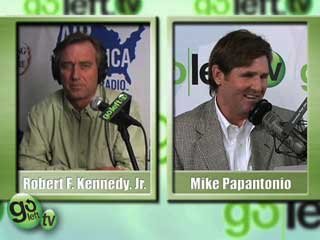 It didn’t hurt to have a partner in Bobby Kennedy.
It didn’t hurt to have a partner in Bobby Kennedy.
For
a long time, he and I were doing an awful lot of MSNBC and Fox, and a whole
array of talking-head pundit things. It didn’t make sense for us. In three
minutes, what can you say that means anything, unless you can say it again
and again.
Bobby is such a personality that people wanted to see him; they didn’t just
want to hear him talk. We thought, let’s put it on something people can
see.
However, he has a horribly strange voice from the dysphonia problem that he
has. People say he sounds a lot like Katherine Hepburn, but listen to what
he says!
Does he have a sense of humor about it?
Oh
my God, yes. He has a huge sense of humor about it.
How has the project been going so far?
The
numbers have been staggering. Yesterday, there were 200,000 visits [to
Goleft.tv] in just one day. We’ve been in business five months. It’s been a
surprise, frankly, meaning that I’m surprised that people have found it so
quickly and so aggressively.
It’s
one thing to say that there is a citizens’ media that is rising, but it’s
another thing to live it day to day and see it.
What is the biggest benefit of citizens’ media?
There is a benefit to people who have a presence on the internet. Here’s
what I mean by that: I don’t care whether you’re talking about satellite
radio or podcast content or purely blog content or internet content. There
is always a need for specialized content. And then it starts crossing
borders.
Now
you have the people from MSNBC or Fox who are getting wind of what we are
doing. They can’t quite figure it out. They know they can’t even do it,
because they look too much like establishment media.
How would you describe Go Left’s visual style?
I
could have a studio that looks exactly like CNN. There is no question about
that. In fact, I had to come to the decision to drop it down a few notches
to where we don’t look like CNN and we don’t look like MSNBC or ABC.
We
did a lot of focus on this: people don’t want something that looks like
something they’ve seen for twenty years.
For
example, why did we choose green? If we’re doing news, everything should be
red, white and blue, shouldn’t it? We really tried to analyze it. Why should
I have a tie on all the time?
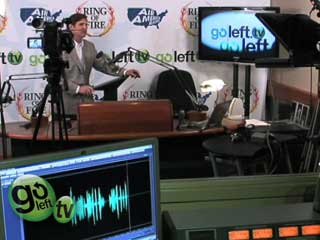 People want to connect with something that they feel is real. It’s not some
absurd fictional creation of some MBA producer who just joined ABC.
People want to connect with something that they feel is real. It’s not some
absurd fictional creation of some MBA producer who just joined ABC.
We’re always conscious of making something that has less pizzazz, but
nevertheless has a quality look to it. It doesn’t look like somebody just
talking into their computer, but it’s something that is being filmed,
produced by an editor.
We
very sparingly use film footage, even though we have access to all that, but
we don’t do it. We simplify it. What more do you need? When you get to that
point, it looks less like citizens’ media and more like a copycat. I go in
just the opposite direction of what you would think.
People are tired of mainstream media. They’re tired of it. They’re tired of
the Brian Williams and the Sean Hannity bullshit and the Bill O’ Reilly.
It’s false.
A
great book was written not too long ago called Man Without A Country [Kurt
Vonnegut, 2005]. It’s a great little short book, but it talks about the idea
that we’ve all been institutionalized about the way things are supposed to
look. It’s part of that consumer-culture argument that we’ve all been
programmed. The more I can get away from that kind of programming, the
better off we are as a citizens’ media.
How would you describe your radio program, Ring of Fire?
The
whole purpose was to create a newsmagazine for radio. That is to be able to
talk about issues that are not hugely political. Everything from
mountain-top mining to pharmaceuticals that are killing people to
exploration of Antarctica to the rise of Blackwater. You don’t know what
you’re going to get week to week. It’s going to sound different week to
week.
There will always be the political overtones. There is no part of American
culture that is not affected by those political overtones. You can take
anything, no matter what the topic, from entertainment to pure, hard
science, and those issues have the webs that pull them into the political
arena. So there always is that political component to virtually anything we
do.
It’s
easy for us to find that political component, not because we’re always
looking, but because intuitively it almost always springs out at you,
whether you’re talking about stem cell research or global warming in the
area of science or Murdoch in the area of the media. All of those things
have their political components.
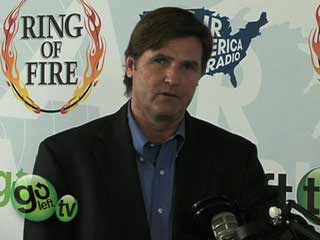 The word “left” has been demonized by the right-wing over the last thirty
years or so. Was it a difficult decision to use that word in your title?
The word “left” has been demonized by the right-wing over the last thirty
years or so. Was it a difficult decision to use that word in your title?
All
the consultants said,
‘Pap, are you nuts!’
But [left is] what I am. That’s what Bobby is. You have to stand in your
boots and die in your boots.
The
real data shows that people admire someone who believes in something and
stays there in what he believes. When we started, we knew that 35-40% of the
public was shifting toward progressive to moderate-progressive. In that
shift, why don’t we just say what we are?
When
you tune in, you are going to get me beating the hell out of the
Republicans. I don’t make any bones about it. I’m not here to say, ‘I’m fair
and balanced.’ I’m not fair and balanced. I don’t like them. There is a
flaw, a character personality flaw in the minds of people who carry on that
political notion of how this world should be. Why would I want to dress up
and look like something that I’m not?
I
have one other advantage, and it’s that I don’t do this for the money. It’s
not something that I do because I am trying to make a bunch of money. It’s
something I do and Bobby does because this is something that we really
believe.
Do the terms “liberal” and “conservative” even apply anymore in real-world
terms?
The
reason the term ‘liberal’ got such a bad name is because of a core neo-con
group who were actually quite brilliant.
It
starts all the way back to a time that was called The Sagebrush Rebellion.
That was during a time when they were trying to put Reagan in office. They
spent in the tens of millions trying to figure out how to wordsmith.
It
was this cabal of neo-con nuts who figured out what they needed to change
about our culture and how they would go about doing that. The very first
thing they had to do was discredit the concept of the word ‘liberal.’ Then
they had to tell a lie and make the lie stick that the media was actually
liberal.
If
you go back and look at their marching orders, what their plan was, their
first attack, was on the term ‘liberal.’ We don’t use the term ‘liberal.’ We
use the term ‘progressive.’ We take the argument away from them.
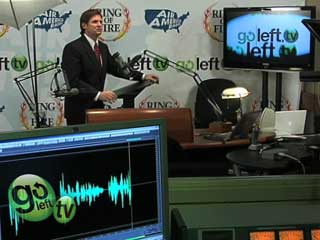 What exactly does the term “progressive” mean?
What exactly does the term “progressive” mean?
Today, progressive means something different. Progressive, to me nowadays,
is more of a populist. A person who understands that it’s not government in
control of corporations anymore; it’s corporations in control of government.
The progressive says, ‘why do I want a corporation making decisions about my
healthcare, or whether or not to send my child to get shot up in a war for
money? Why should I let them control my pension plan?’ All of these things
are primarily money issues, but secondarily moral issues. The progressive
label is really the closest thing to a populist.
How did a Southern Methodist like you become a progressive?
I
had the advantage of being raised by different families. About seven
different families raised me all through different parts of Florida. In
retrospect, it was a wonderful way to be raised. I did have my core family
at one point, but then I had my exposure to many different families.
Any
time you live in people’s homes and you see different parts and different
pieces of those people, you have an appreciation of all parts of what’s
human. I don’t think one thing simply engrained my ideology. It was just
having the advantage of seeing how people live and what people struggle with
day to day.
I
think what moved me the most is when I became a lawyer. I saw that the
things that I had suspected while growing up were true. I see what
[the big corporations] do to people’s lives.
Until you depose these people and cross-examine them and have them in a
courtroom, you see how evil – and there really is no other way to put it –
how corrupt and evil a true renegade corporation has the potential to be.
I
say ‘renegade corporation’ because I clearly believe in the free-market
system. I believe that free-market capitalism is a wonderful thing. But
free-market capitalism has only been corrupted by greed.
It
used to be that a corporation would have a CEO who would work for that
corporation for 25 years. Now the CEO, if he works there for five years,
it’s extraordinary. He’s trying to extract as much as he can for his
shareholders, so that he can get a bigger bonus and say that he’s a hero to
his shareholders.
That
has shaped my opinion about what we have to do as a democracy to protect
ourselves. It is a stacked deck. You can’t fathom – until you try cases
against these people – what their capacity for ugliness really is. Until
then, you can’t fathom how at risk not only capitalism is, but democracy.
Isn’t it frightening to go up against major corporations and accuse them of
doing shady things?
Realistically, it’s not something that makes you paranoid or concerned about
anything that they would do to you beyond what they would do to you
politically. I have friends, for example, who have been targeted over the
years for their political beliefs. And they’re wonderful people.
Have you ever considered running for office?
I
never want people to have the belief that I am running for anything. The
reason I’m always in an attack mode is because people feel like I talk. It’s
sitting back there somewhere, in the recesses of their brain.
Kinder and gentler doesn’t work. It’s like showing up at a gunfight with a
knife. There is no niceness about what we are up against. I want to be
honest. ‘The Pap Attack’
is a progressive who is pissed off. The theme of
all the emails and phone calls is always,
‘thank
you for saying what I’ve been feeling but couldn’t say.’
Email
us Let us
know what you
think.
Features
Return to the features page.